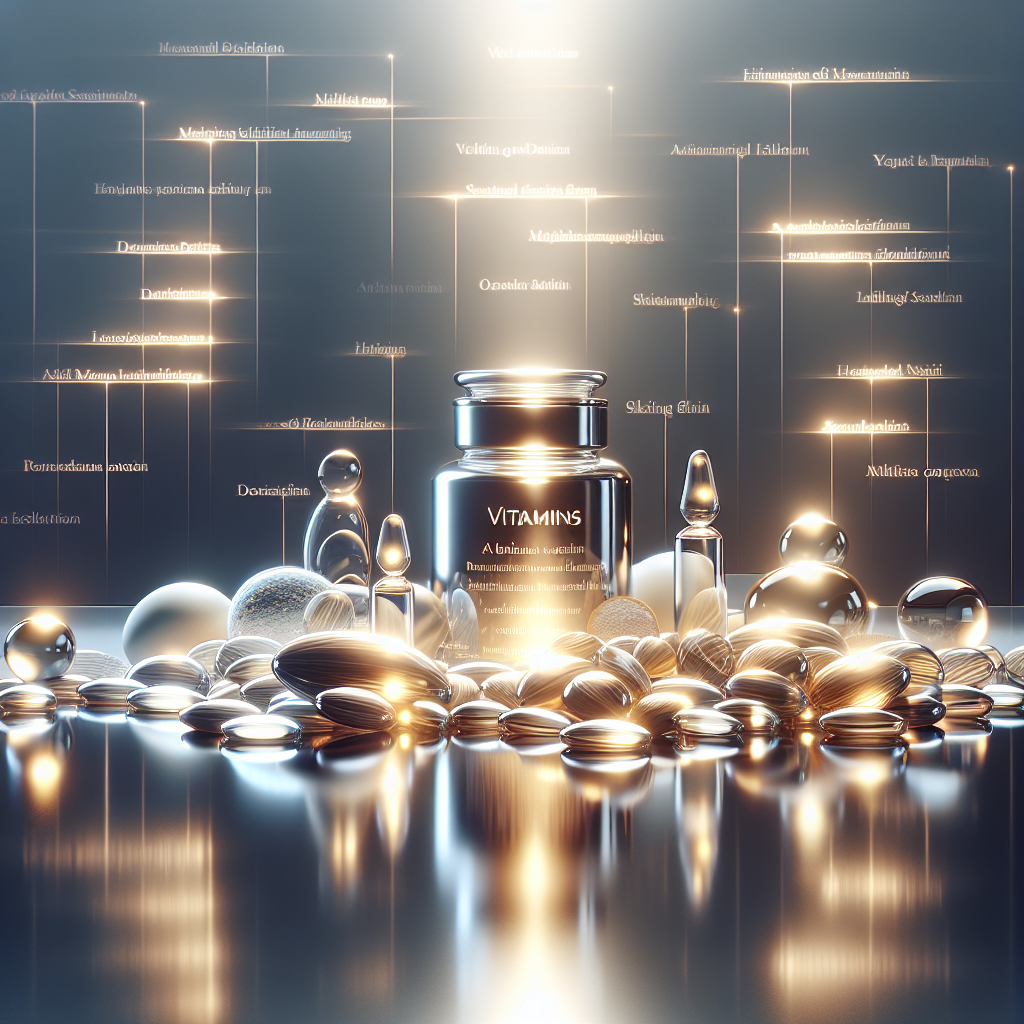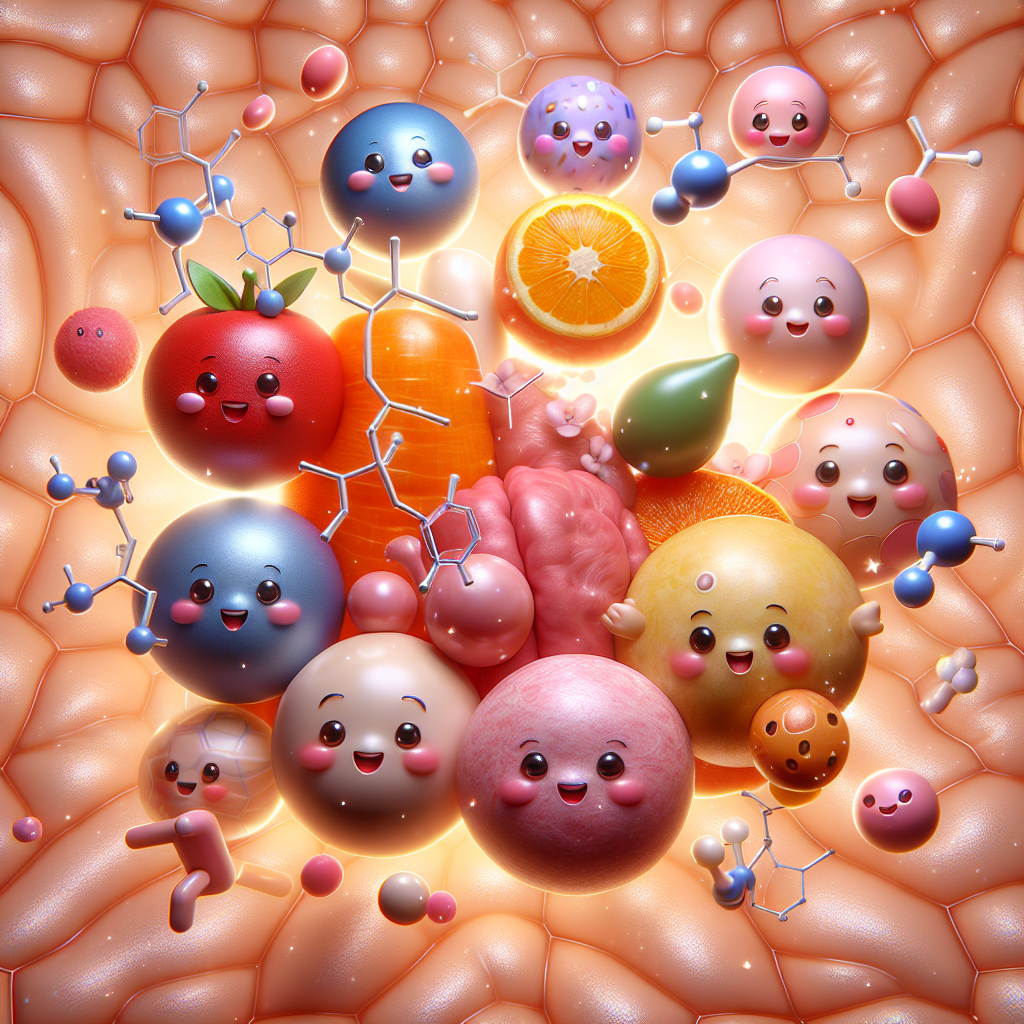Vitamins That Keep Skin Looking Youthful

Discover the secret to youthful-looking skin with our range of vitamins. Don’t wait, rejuvenate your skin today! Click here to explore our products.
Essential Vitamins for Maintaining Youthful Skin
The quest for youthful, radiant skin is a universal pursuit that transcends age and geography. While topical skincare products and treatments play a significant role in maintaining skin health, the importance of a balanced diet, rich in essential vitamins, cannot be overstated. Certain vitamins, when consumed regularly, can help keep your skin looking youthful and vibrant.
Firstly, let’s consider Vitamin A, often hailed as the cornerstone of skin health. This fat-soluble vitamin is crucial for cell growth and differentiation, playing a critical role in the healthy development of skin cells. Vitamin A helps to speed up healing, prevent breakouts, and support the skin’s immune system, thereby promoting natural moisturizing. This means it helps to keep the skin hydrated, giving it a radiant, youthful appearance. Foods rich in Vitamin A include sweet potatoes, carrots, and spinach.
Next on the list is Vitamin C, a potent antioxidant that aids in the skin’s natural regeneration process. It helps the body repair damaged skin cells, leading to healthier, more youthful skin. Vitamin C also plays a pivotal role in collagen synthesis. Collagen is a protein that gives skin its elasticity and strength. As we age, collagen production decreases, leading to wrinkles and sagging skin. By boosting collagen production, Vitamin C can help to maintain skin’s youthful firmness and reduce the visible signs of aging. Citrus fruits, strawberries, and bell peppers are excellent sources of Vitamin C.
Vitamin E, another powerful antioxidant, deserves special mention. It helps protect the skin from damage caused by free radicals and environmental stressors like UV rays and pollution. By reducing oxidative stress, Vitamin E can help prevent premature skin aging, keeping your skin looking fresh and youthful. Foods rich in Vitamin E include nuts, seeds, and spinach.
Vitamin K is another essential nutrient for skin health. It plays a key role in the body’s blood clotting process, which helps the body heal wounds, bruises, and areas affected by surgery. The topical use of Vitamin K can help reduce swelling and bruising, improve the appearance of spider veins and scars, and even help with the dark circles under the eyes. Foods rich in Vitamin K include leafy green vegetables, broccoli, and Brussels sprouts.
Lastly, the B-vitamins, particularly B3 (niacin) and B5 (pantothenic acid), are vital for maintaining skin health. B3 helps to improve the skin’s barrier function, which helps to lock in moisture and keep out irritants. It also reduces redness and blotchiness. B5, on the other hand, helps to keep the skin soft, smooth, and healthy. It has anti-inflammatory effects that can help stimulate your skin’s healing processes. Foods rich in B-vitamins include whole grains, meat, eggs, and legumes.
In conclusion, maintaining youthful skin is not just about what you apply topically, but also about what you consume. A balanced diet, rich in essential vitamins, can go a long way in keeping your skin healthy and youthful. However, it’s important to remember that while vitamins are crucial for skin health, they are just one piece of the puzzle. Regular exercise, adequate sleep, and proper hydration are also key factors in maintaining a youthful appearance. Always consult with a healthcare professional or a dermatologist before making any significant changes to your diet or skincare routine.
The Role of Vitamins in Skin Rejuvenation and Anti-Aging

The quest for youthful, radiant skin is a journey that many embark on, and the role of vitamins in skin rejuvenation and anti-aging is a topic that has garnered significant attention in recent years. As we age, our skin naturally loses its elasticity and begins to show signs of wear and tear. However, certain vitamins can help to slow down this process, keeping our skin looking youthful and vibrant for longer.
Vitamin A, for instance, is a potent antioxidant that plays a crucial role in skin health. It aids in the repair and maintenance of the skin, helping to reduce the appearance of fine lines and wrinkles. Retinol, a derivative of vitamin A, is a common ingredient in many anti-aging skincare products due to its ability to stimulate the production of new skin cells and improve skin texture.
Next in line is Vitamin C, often hailed as a ‘skin savior’. This powerful antioxidant helps to neutralize harmful free radicals that can cause damage to our skin cells. It also plays a vital role in collagen synthesis, a protein that gives our skin its firmness and elasticity. Regular use of Vitamin C can help to brighten the skin, fade dark spots, and reduce the appearance of fine lines and wrinkles.
Vitamin E, another antioxidant, works in synergy with Vitamin C to protect the skin from environmental damage caused by exposure to the sun and pollution. It helps to keep the skin hydrated, promotes wound healing, and can help to reduce the appearance of scars. When used in combination with Vitamin C, it can enhance the effectiveness of sunscreen, providing an extra layer of protection against harmful UV rays.
Vitamin B3, also known as niacinamide, is another key player in the realm of skin rejuvenation. It helps to improve the skin’s barrier function, keeping it hydrated and reducing the loss of moisture. It also has anti-inflammatory properties, making it beneficial for those with skin conditions such as acne or rosacea. Regular use of niacinamide can help to improve skin texture, reduce the appearance of pores, and even out skin tone.
Lastly, Vitamin K is often overlooked but plays a significant role in skin health. It is known for its ability to improve blood coagulation, which can help to reduce the appearance of dark circles under the eyes. It also aids in the healing of wounds and bruises, making it a valuable addition to any skincare routine.
In conclusion, vitamins play a pivotal role in skin rejuvenation and anti-aging. Incorporating them into your skincare routine can help to keep your skin looking youthful and radiant. However, it’s important to remember that while topical application of these vitamins can provide numerous benefits, a balanced diet rich in these nutrients is equally important. After all, true beauty comes from within, and a healthy, well-nourished body is the first step towards achieving glowing, youthful skin.
Top Vitamins to Incorporate in Your Diet for a Youthful Glow
The quest for youthful, glowing skin is a universal pursuit that transcends age and geography. While topical creams and serums play a significant role in maintaining skin health, the importance of a balanced diet, rich in essential vitamins, cannot be overstated. This article will delve into the top vitamins that you should incorporate into your diet to keep your skin looking youthful.
Vitamin A, often referred to as the ‘skin vitamin’, is a potent antioxidant that aids in the repair and maintenance of the skin. It helps to speed up healing, prevent breakouts, and support the skin’s immune system, making it look radiant and youthful. Foods rich in Vitamin A include sweet potatoes, carrots, and leafy greens.
Next on the list is Vitamin C, a powerhouse vitamin that is crucial for the production of collagen, a protein that gives skin its elasticity and firmness. Vitamin C also helps to protect the skin from damage caused by free radicals and UV exposure. Citrus fruits, strawberries, bell peppers, and broccoli are excellent sources of this essential vitamin.
Vitamin E, another antioxidant, works in tandem with Vitamin C to protect the skin from sun damage and inflammation. It also aids in skin repair and moisturization, making it a vital component for maintaining youthful skin. Foods like almonds, spinach, and avocados are rich in Vitamin E.
Vitamin K is often overlooked but plays a significant role in the body’s healing process, helping to repair skin conditions like scars, stretch marks, and dark spots. It also aids in blood clotting, which can help to reduce the appearance of spider veins and dark circles under the eyes. Incorporating foods like kale, spinach, and Brussels sprouts into your diet can help you reap the benefits of Vitamin K.
B Vitamins, particularly B3 (niacin) and B5 (pantothenic acid), are also essential for skin health. B3 helps to improve the skin’s barrier function, which helps to lock in moisture and keep out irritants. B5, on the other hand, has anti-inflammatory properties that can help soothe irritated skin. Foods like chicken, tuna, and sunflower seeds are rich in these B Vitamins.
Lastly, Vitamin D, often known as the ‘sunshine vitamin’, is crucial for skin protection. It helps to rejuvenate the skin, repair skin damage, and fight off free radicals that can cause premature aging. While sunlight is the best source of Vitamin D, it can also be found in foods like fatty fish, cheese, and egg yolks.
In conclusion, maintaining a youthful glow is not just about what you apply to your skin, but also about what you put into your body. A balanced diet, rich in these essential vitamins, can go a long way in promoting skin health and keeping your skin looking youthful. However, it’s important to remember that while vitamins are crucial, they are just one piece of the puzzle. Regular exercise, adequate sleep, and proper hydration are also key components of a holistic approach to skin health.